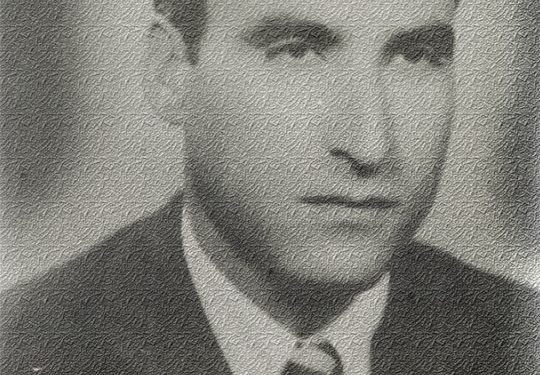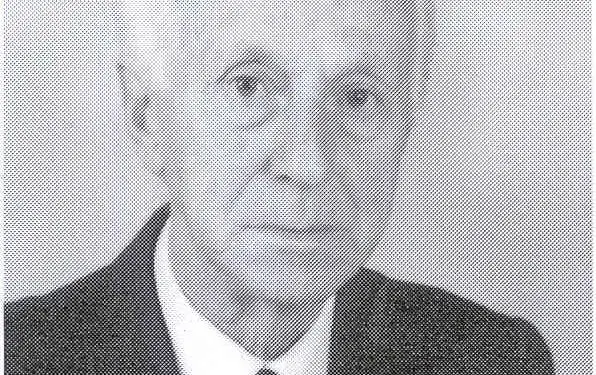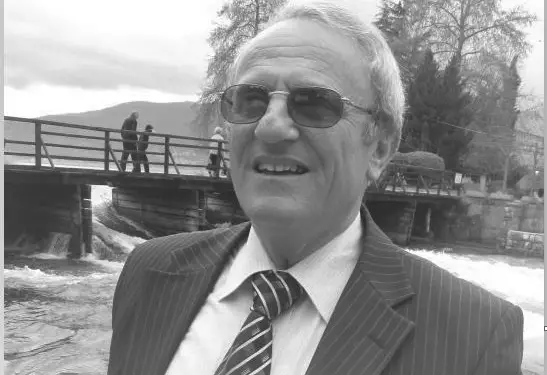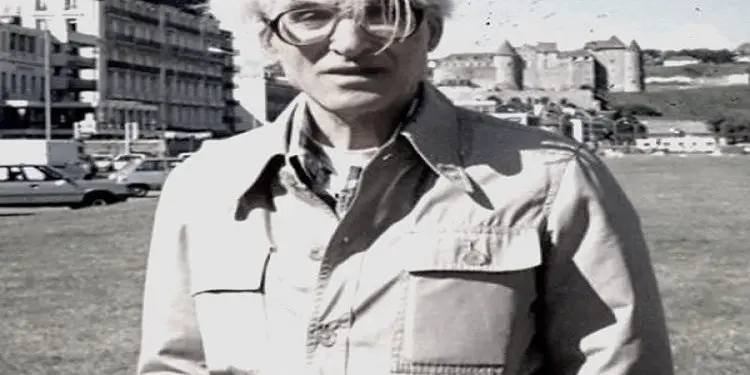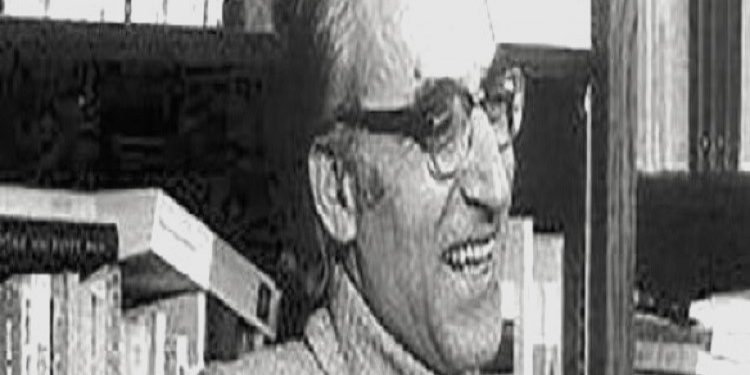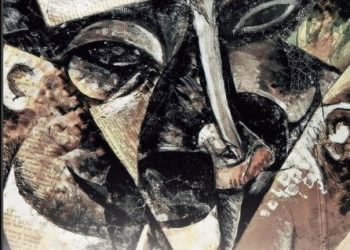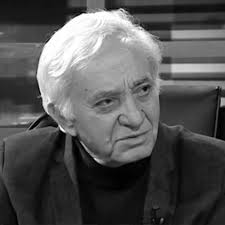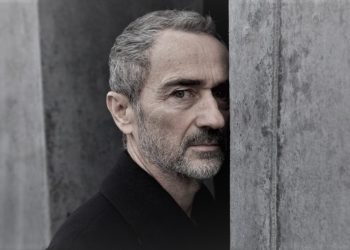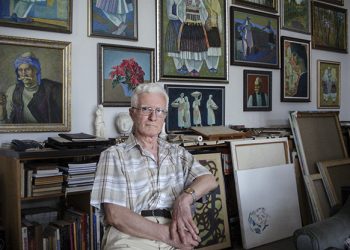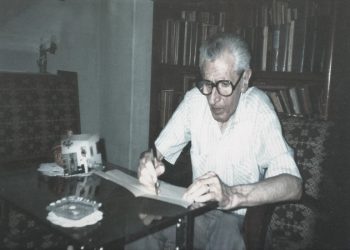From Shpendi Topollaj
– About Uran Kalakulla’s book: “Arshi Pipa – man and work” –
Memorie.al / In the still blind and almost unknown gallery of the life and work of Professor Arshi Pipa, the publication of the brilliant poems in the “Prison Book”, or something else from his creativity, was only a torch which also why it shines with solemn majesty, it could never illuminate the endless treasures he left to our culture and literature, the man who, after November 1944, gave justice to the disappointed Stendhal who said: “Blessed are the heroes who died before 1804”, so when Napoleon overthrew the republic and declared himself emperor.
This is the first reason, perhaps that gives special value to the work by the real academic, the honorable Uran Kalakulla, to then go to the wise and far-sighted phrase of Martin Camaj that Albania will be a free country only when the Albanians can to know and appreciate their great writers like Arshiu, to whom Fishta’s verses are like:
“Except yes, my Albanian fairy,
Side by side we sing together.
We have built memorials.
Rrfe`as mot, don’t crush me”.
The history of human development shows us that the path to the top, both before and after Christ, is difficult. God only knows what dangers faced those who aimed for the poles, like Scott, Amundsen and Piri, or those who conquered Everest like Hillary and Tenzingu. This is why Graham Grini, in the interview given to Vili Winkler, said: “I cannot understand life without facing a risk.” He is the one who gives it flavor.” And this fragrance becomes even more enticing when the life and fate of the one who writes clings like two drops of water to the life and fate of the one about whom it is written.
Who else better than his brother-in-law, a thinker and a patriot like him, who, chained hand and foot with irons in the death cell, for 64 days in a row waited to be shot, at the age of 32, a sentence that then returned you to prison, where he stayed not a little, but a full 21 years, he could write about such a great figure as that of the democratic anti-communist, poet, critic, philosopher, linguist and political scientist Arshi Pipa, who, speaking of Kroce, explains his moral principles , saying: “…the beautiful and the honest are divided between them. So, a moral work or not, is up to the artist. Thus, a scandalous book can go aesthetically, but the author should never write”.
In the book, someone is quoted as saying about Arshiu, that; “You were a light when Albania was covered in darkness, you were a pillar when the Albanian world collapsed around it. Arshiu spoke and wrote when most were afraid to breathe”. But also the suffering, endurance and work in secret behind the prisons, give Uran Kalakulla the same right to mention Marat’s lecture in the famous year `93, when he was taken to court by the Zhirondisians, he declared: “I am not like you, that only yesterday you went free, I have enjoyed the love for him since my mother’s womb and I was free 40 years ago, when France was inhabited by slaves. My pen has had no other restraint than that of truth. If all the decisions of the world are collected, it will never know another”.
Take it as you like, but when you read Uran’s book about Arshi Pipa, you will see that he also wrote about himself. He, as the protagonist of his book, was one of those martyrs that Mur (Moore) was looking for, in “Fiji Family”: “Who should not keep suffering and should not lose hope”. He, as his protagonist in very serious situations, resembles that character of Remark who said: “Let’s eat the hope with which we have nothing else to eat. Let’s eat up all the hope that can be found. We have to get over this situation and get over it because it doesn’t…”!
That’s why he has found the strength, as his protagonist who wrote on cigarette paper, to write “Grammar – Methodical Albanian Language” 760 pages, “Portrait Album” 200 pages, the satirical poem “Zullumqaret”, the science fiction novel “Electronic Robot” “, “Philosophy History” 500 pages, the erotic novel “Erotic Passion” 300 pages, the treatise “On Personality” about 200 pages, the historical novel “Falkoi i Arbërit”, starring Avni Rustem, about 700 pages, the other historical novel, titled amended “Free fatality” 450 pages. And as if they were written 2000 or 3000 years ago, at the time of the Greek tragedies, most of these works will never fall into the hands of readers, as they have been lost.
But even so, they do a service: they teach us that when it comes to destroying culture, the greatest asset of the people, despotic regimes, what they cannot do for centuries, they do as real monsters in a terribly short time short. At the same time, I mentioned them, to argue my conviction that Urani had already started to write “Poems”, “Ditar poetk”, “Ditar” with prose in his high school years and that after leaving prison, he appeared with a lot journalistic works, which are being published in two volumes, and he has almost 300 pages of childhood memories, 400 pages of prison and exile, and he has published the essay entitled “Albanianism and its European tendency”. With all this experience, he finds it difficult to separate the work of Arshi Pipa from Arshiu himself.
All this is at the height of the scientific treatment of his figure. I say scientific, because Arshiu himself worked all his life with the scrupulousness of a scientist. As early as 21 years old, Arshiu, choosing Henri Bergson’s philosophy as his diploma subject and unabashedly revealing his critical views towards the Nobel laureate, without worrying about the surprise and even opposition of the great rector Paola Laman, who was one of the patriarchs of to the European professors of philosophy, was evidenced as a champion of courage and free thought.
It cannot even be thought that at that time Arshiu did not know Lucian, who told about the philosopher and historian Callistus, who died in prison because he rebuked Alexander, he had not heard how Voltaire, after writing the “Philosophical Letters”, was in danger of being imprisoned, so he escaped in Holland and Heinrich Mann in 1933, he left Germany for France, Portugal and the USA, because he knew what awaited him in the Hitler regime, but it did not scare him. Let him finally die, as Elyari said, for the immortality of others. He did not give up on democratic ideas and activity, even when he had to experience disapproval and hatred, even from the blind crowd.
He only remembered, laughing, the fate of that learned Scythian, friend of Solon, that is, in the 6th century – before the new era, which traveled to bring culture and as a reward was killed by his compatriots. The staunch anti-fascist, Arshi Pipa, published in 1943, the poetic volume “Nailors”, and a year later, the magazine “Kritika”, which did not have a long life, but which remains the only one of its kind in our country. In prison, he wrote the essay “Sketches for the conception of life”. Then, after the escape, he published “Meridiane”, “Rusha”, “Trilogy” (three volumes), the criticism entitled “Montale and Dante”, “Studies for Kosovo”, “Albanian Stalinism – Political Aspects”, “Albanian Literature”. ” etc.
Knowing several foreign languages, he writes in these languages and translates various authors into Albanian, such as; “Latin poetry”, but also deals with the problems of the Albanian language, with that of the dialects, about which he says: “I sympathize with a situation like today’s, when a small Albania, a very rare example in Europe, I am a lady who can express herself in two literary languages. This is a sign of wealth, of culture, which is lost to us, whatever its cause”. Arshi Pipa does not object that it should be objected, he argues: “Gegenishta, he says, with Tuscan, complement each other in the literary field in a fortunate way. There are things that she says more forcefully, the other expresses more pleasantly”. He translated Lucretius into Greek, because there he finds “the mammoth jerks of thought and the all-round excitement of the soul”. On the contrary, he brings Virgil to us in Tuscan, “not that he cannot be translated well and in Greek, but that something vague and fluid that is in his poetry is better spread in Tuscan…”!
He thinks the same about Catullus and Horace. And he also writes himself, to be more precise, that he knows how to use both dialects with such skill that in this field one cannot find a friend. Compare “Shemo the thief” and “Kupe Danja” for this. This attitude of Arshi Pipa after the Albanian Language Computing Congress, as is known, raised a storm against him. An opportunity was found to break the pens and throw mud on Arshiu’s positions, especially by the penmen of the official ideology, but also by ignorant people.
Uran Kalakulla, with a cold mind, excellently analyzes this moment so important and so sincere of Arshiu, without forgetting to make his own remarks, especially for his great passion that leads him to rushed conclusions and his zeal for Gehrish that leads to conservatism. I took into account the remarks that the author makes to his protagonist. Well, when you read the whole book you will find lots of them that often take the form of a critical attitude. This is more to present his views as an author, but also because the closeness with Arshiu himself has given him the opportunity to tell him what he has to say in his eyes forever.
And what makes you happy is that the erudite philosopher himself reflected on wrong attitudes and thoughts. Was it not Arshiu himself, the one who in a program article; “The critical spirit”, he said: “In art and literature, in science and philosophy, even in religion, criticism is the basis of every safe construction; criticism is the sign of a mature mind”? With Arshiu, in the period of the war, a period that Kalakulla calls in the book, the time of illusions, it is exactly like with David of “Lost Illusions”, about whose naivety Balzac says: “High spirits barely understand the existence of the evil of ingratitude” and then, to be convinced of this, “they need some hard lessons from life”.
Arshi Pipa learned the harsh lessons from life, in swamps and prisons, about which he wrote poems:
“O Buchenwald, O Majdanek, Dachau!
I started the song for you and didn’t finish it,
Here I will do it where I sealed it in my ashes,
Everything nearby the German burned and killed”.
He learned these lessons when the communists killed his brother, Myzafer, so he has manhood, when he came back after 35 years of exile to affirm: yes, you are right, and then we made a grave mistake! Speaking about the life and work of the great man Arshi Pipa, Mr. Uran Kalakulla, neither simply follows a chronological order nor focuses his attention only on what he did and what path his hero followed. It gives the impression that he sometimes forgets that he is writing for someone else. In the book there are passages, often whole pages that speak in the language and mind of the author himself. As if there is a combination, a comment, an intervention or an assessment for everything related to the name of Arshiu.
For illustration, I am quoting something: “The intellectual layer, as can be seen especially its cream, which has fame and prestige, as if it respects its independence a little as strongly, and in a way, to put it bluntly, somehow with your own eyes, you see the movements from top to bottom. She finds out about this wrong attitude only when, in her indifference, the teams that takes power, especially those of a dictatorial nature and in which there is an obvious lack of intelligence and culture, start and put both feet on the intellectuals. Shoes or, they then force them to work as Chechuas for them, or eliminate them altogether, even physically”.
Likewise, analyzing the “Prison Book”, he writes with an obvious literary nuance: “A poetic volume in this respect resembles a garden with different flowers, each of which has its own beauty. It is the visitor of this garden, who gives himself the right to select this or that flower, to make the bunch that he will take with him, to enjoy their fragrance as long as possible. Or wouldn’t it be better to compare this collection of poems as a necklace of pearls where there are flowers of gold, precious stones, such as zephyr, emerald, topaz, ruby, and diamonds? Come on then choose if you want. Temptation torments you at every moment, as soon as you touch each one you delight in its splendor.
However, more than pearls no doubt the jewel catches your eye! And there are jewels in the entire work of Arshi Pipa, so much so that the author of the book dedicated to him, fascinated by their beauty, surrenders, as happens to us not infrequently, to the divine beauty of a girl, whom we don’t even dare to take and describe, that it seems to us that we lower its values. When it comes to the writings, “Dante and Montale”, he is satisfied with only a dignified excuse:
“It seems to me that we would spoil the beauty of such a precise introduction, which gives us the essence of the whole work, if we were to add something from ourselves”…! We said at the beginning that Professor Pippa’s literary work is a library in itself. What is written?
There, it has the dimensions of a gallery which, being dark and almost unknown, felt the need of a guide, with a candle in hand, to take the visitor to each exhibit, a job that this study of Uranus Kalakulla, who must feel fully satisfied and rewarded as he himself hopes in the preface to his book.
When he returned to Albania, at the beginning of July 1992, Arshiu who had once written; “Otherwise I have Bajram and Easter / we have faith and honor together”, it was received as the boy who was unfairly driven away as a prodigal, knocks on the door in the hope that everyone will be happy for him, after they realized that they had wrong once But unfortunately, with the one who deserved a laurel wreath, it was not quite like that; someone, and these were the wise, hastened to open the door and jump on his neck, someone saw him suspiciously, cursed him with dirty words that came out of an old man’s mouth full of drool, and from there by the black assef , where he has been used to sitting next to the fireplace ash for years, a wretch who waits for the oar, to straighten his ugly hump, the slander about Arshiu that he allegedly said “hang the communists” and whoever is predisposed to believe, believes easily.
They had committed a crime once by driving away their good son and brother, they were committing a hundred times crime, wanting not to accept him, who brought his country treasures of culture and glory. Well, he only said: “No damn, it’s not about revenge at all, plenty of prisons and deportations, because otherwise this work will never end”. But even if he made a small joke and said: “erect a monument to those who imprisoned and exiled us, who humiliated and impoverished us”, the hunchbacks and the ignorant would repeat with symbilism: beware, he is a police agent! Thus reminding us of those unengraved and suspicious muzhiks, who did not accept the lands that were donated to them by their manor Nekludovi.
Oh god, what has found us! But anyway, the sound of crashing waves that carry the ashes of this personality’s body, speak. They will always remind us that he, with his life and work described with such love, by the honorable Uran Kalakulla, deserves those heartfelt words that Hygoi said at Balzac’s funeral: “In our time, there are no more illusions. Now we don’t look at the rulers, but at the thinkers, that’s why the whole country trembles when one of these big heads disappears…, fate knows what it does, when it puts the people face to face with the highest mystery and makes them think that death is the highest equality as well as the highest freedom.
The souls of all should be filled only with serious and majestic thoughts, when a lofty soul who has risen above the multitudes, with the wings of genius, suddenly opens his wings to disappear into the unknown, dies with glory. No, not to the unknown… this is not hell, but light. This is not nothingness, but eternity. It’s not the end, but it’s the beginning.” Memorie.al




